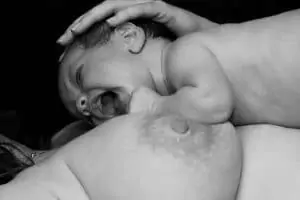Does breastfeeding make you sleepy? Breastfeeding makes me sleepy, well, at least it did when I was still breastfeeding. I can tell you first-hand that I dozed off on many occasions as a nursed each of my daughters.
Something else I can tell you is that it’s normal to be feeling weak while breastfeeding. And while it didn’t happen to me, breastfeeding nausea and dizzy feelings do happen too. But the dizziness is more about you being hungry and the nausea is all about your hormones.
There’s a lot to unpack here with this whole breastfeeding exhaustion thing. So let’s get right down to it, and I’ll explain what’s going on.
Does breastfeeding make you tired and sleepy?
Well, yes, but there are several reasons why you have breastfeeding fatigue and exhaustion. For starters, it’s so completely normal to be tired during your postpartum days. I think I was full-on exhausted for a good 6 weeks.

On top of that, your body is such a miracle. It’s busy making milk for that baby. Even if you decide to bottle feed, though, your body is still this amazing thing trying to get back down to size, produce the right hormones, and heal itself. And if you’re breastfeeding, expect to be exhausted. You need to nurse your newborn every 2 to 3 hours, and that takes TONS of energy.
Do you have other children at home too? No wonder you have breastfeeding exhaustion!
Now, if you’re feeling weak while breastfeeding, I’d like to remind you to please take care of yourself. You are no good to anybody else as a martyr. That means eating nutritiously and resting when you can. I have some tips for that below, but breastfeeding and dizziness only come when you do not eat enough.
FYI, your body burns up about 500 calories per day breastfeeding.
You need to eat more than you usually would to help keep up with that. Breastfeeding itself does not cause dizziness. However, with your crazy hormones and your body’s need for more calories, you can absolutely feel a little bit dizzy. Solution? Eat, and eat right. You will feel so much better.
Here is the post-c-section diet plan for you.
Can breastfeeding make you feel unwell?
So, I just touched on why you might feel dizziness while breastfeeding, which has nothing to do with breastfeeding itself and is more about your caloric needs at this time. However, some moms do feel rather unwell during early breastfeeding days.
Breastfeeding nausea can and does happen. And while I was lucky enough not to have that problem, my dear friend Liz, who had probably had the worst case of morning sickness for all her pregnancies ever, suffered from this fate. By the 6th week, she was feeling gobs better.
What gives?

Well, if you find yourself with nausea during breastfeeding, it’s likely related to the release of oxytocin. Oxytocin and breastfeeding go together like milk and cookies. This hormone releases the milk, but the side effect is that it can aggravate the other gut hormones, so you could have nausea.
It can feel like your blood sugar is low, your head may hurt, and then you may experience waves of nausea. I’ve always found for any nausea to use one of those alcohol wipes. Just smelling the alcohol can abate nausea in seconds. And just so we’re clear, that’s rubbing alcohol, not booze!
Why does breastfeeding make me sleepy?
Well, doll, part of it is because you’re already exhausted. But the other part of it is thanks to prolactin, a hormone in your breastmilk. It releases into your bloodstream when you’re nursing. It soothes you and helps you relax.
There’s nothing wrong with being a little sleepy, especially when you should be bonding with a baby through those skin-to-skin nursing sessions. Just make sure you’re in a safe space, and that baby isn’t in danger of falling out of your lap, and enjoy the rest whenever you can get it!
Does breastfeeding drain your energy?
Trust me, breastfeeding exhaustion is a real thing. I’ve been through it with both of my daughters, and every mom I know has too. So, it’s not just you.
However, if you feel like breastfeeding fatigue is so extreme you can’t function, it can’t hurt to let your doctor know. Feeling weak while breastfeeding could be more than extreme hunger or exhaustion. Your doctor can check your iron levels and other things.
They may also be able to recommend safe energy supplements while breastfeeding. In addition to that though, be sure to stay on top of your water intake and remember…objects at rest stay at rest while objects in motion stay in motion. Keeping some activity will help you feel better.
How can I stop falling asleep while breastfeeding?
Don’t get too down on yourself. You’ve just gone through one of the biggest changes ever. It’s a special time, and it’s going to take time while your mind and body adjust.
While it is certainly nice to fall asleep while breastfeeding, you might be concerned (and rightfully so!) about the baby falling out of your arms or bed. As I said before, find a safe place to nurse so you don’t have to worry should you drift off in the middle of it.
But if you don’t want to fall asleep while breastfeeding, here are some tips to help you stay awake:
- Get up from your bed – Simply walking into the other room can help keep you awake for a little while longer. Try to move every 20 minutes.
- Occupy yourself – Write in your journal (this is such a great time for journaling), read up on baby stuff, organize baby things, or even watch a TV show you love.
- Drink some water – It’s so important while breastfeeding, and it will wake you up.
- Have a healthy snack – This will also keep you from feeling dizzy, but make sure your snack is something healthy. Veggies and hummus are a nice way to bring balance to your body while keeping it feeling satiated for a while.
- Try a game – Word games, puzzles, and these sorts of things can engage your mind.
Ways to Fight Breastfeeding Fatigue
At any time of day, that breastfeeding exhaustion can come into play. You might feel sleepy, tired, cranky, hungry, or dizzy, or a combination of these all. Keeping your body happy is the best way to keep your breastmilk supply going strong and keep you healthy overall.
So, how do you give yourself what you need?

- Give in to the rest
Everyone says to sleep when the baby sleeps, but it really is one of the few ways you’re actually going to get sleep during these early days. Do your best to rest during these moments. And go to bed early. You’ll have plenty of time to stay up late in a few more weeks.
- Don’t be shy to ask for help
Oh sure, my husband may now conveniently have to poop when there is housework to be done. But when our girls were babies, he was happy to lend a hand. Your spouse or any family and friends can always come to your aid. Some people don’t want to overstep their bounds, so be sure to ask.
As much as my in-laws drove me nuts at times, I was relieved to have them around. It meant I could get some rest or that someone else was doing the cooking or cleaning.
And while I’m on that topic…seriously, let it go. Don’t get hung up on how your mom or your mother-in-law does the chores or cooks something. As long as you have some help, that’s what’s important.
If it bothers you that much the way your family folds the laundry, you can also hire someone to clean. I know it’s an option for some of you, but if it’s not, there are plenty of charities that help new moms, so if you don’t have anyone, please don’t feel stuck. There are great people out there who are willing to volunteer to help you until you can help yourself.
- Leave the mess
I remember my old college boyfriend who loved The Simpsons. In one of the episodes, Homer was running for a city official position (I think it was sanitation), and he came up with a slogan: “Can’t someone else do it?”
And that’s what I’m saying to you now. Can’t someone else do it? Those chores are not important. Better Homes and Gardens isn’t coming to photograph your home so just chill. That crap can all wait until tomorrow. And if it can’t, see above!
- Put a limit on visitors
By the same token, you don’t want a house full of people ALL the time. Of course, they all want to see the baby, but set limits to the number of visitors at once and their visit length. For those that want to help, that’s wonderful, but you do need time to yourself and time with your baby to bond so do keep that in mind.
- Eat nutritious foods

If you are breastfeeding and dizzy, eating is even more important. Even if you just feel tired, remember that food nourishes you. And while breastfeeding, the foods you eat come through in your breastmilk. You want to nourish yourself and your baby too!
Talk to your doctor about energy supplements while breastfeeding but don’t take anything without getting the OK. Focus on eating lots of protein, lots of fruits and veggies, and drinking lots of water. Caffeine is fine in small amounts, but it can dehydrate you, so make sure you follow your cup of coffee with more water.
Your doctor may also tell you to keep on taking those prenatal vitamins for a while after giving birth. These can also help bring balance to your hormones, which may make you hit the baby blues.
If you still feel sadness for weeks after you’ve given birth, don’t ignore it. Call your doctor because it could be more than just the typical baby blues, and they will have ways to help you get back to feeling like yourself.
- Start some activity
Your doctor will tell you it’s fine for most new moms to take short and easy walks. Getting in some movement definitely helps after a c-section, too though you will want to take it easy.
Don’t do any strenuous exercise until after your postpartum checkup when your doctor gives you the all-clear. But a nice walk around the neighborhood with the baby in a stroller can help you feel much better from head to toe, inside and out.
How do I know if something else is wrong with me?
When you try out these tips, and you still feel like you have zero energy despite resting, eating well, and drinking plenty of water, there might be something else going on. Even if you’re just paranoid, it’s better to call your doctor to be sure.
Your doctor can check you for anemia, excessive blood loss, check your thyroid to see if it’s underactive or see if you have postpartum depression. He or she will help you get to the bottom of what’s bothering you, so don’t delay caring for yourself. Yes, it’s essential to take care of a baby, but the baby needs you too, so be sure to take good care of yourself!
Leslie Berry lives with her husband and two young daughters in Los Altos, California, where she loves helping other moms get comfortable with motherhood and embracing the insanity with facts peppered with laughs.
She loves eating too much sushi, exercising, and jamming out on her Fender. Read more about Leslie here.






